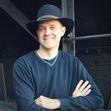Week 2, Day 3: Habit
These commandments that I give you today are to be on your hearts. Impress them on your children. Talk about them when you sit at home and when you walk along the road, when you lie down and when you get up. Tie them as symbols on your hands and bind them on your foreheads. Write them on the doorframes of your houses and on your gates. (Deuteronomy 6:6-9)
 A mezuzah, often affixed to the doorposts of Jewish homes, containing the scripture above. From Wikimedia Commons
A mezuzah, often affixed to the doorposts of Jewish homes, containing the scripture above. From Wikimedia CommonsOne of our human superpowers is our ability to program ourselves with new habits. The principle is “neurons that fire together, wire together,” and anything we repeat often enough becomes automatic.
I am regularly amazed that, after decades of driving, I can make the two-hour trip from Birmingham to Huntsville, arrive safely, and have almost no memory of the trip. My brain was able to hand off a potentially dangerous activity to parts of my brain that needed no attention. I avoided potholes, took the correct exits, and navigated heavy traffic while my mind was focused on an audiobook.
I remember learning to drive. I was sixteen and feeling overwhelmed by all the things I was supposed to pay attention to: gauges, speedometer, side mirrors, and how to move my feet between brake and clutch. But with thousands of hours of practice, the car became an extension of my own body.
The dorsal striatum is a part of the brain essential for habit formation and automatic behaviors. Another part of the brain, the anterior cingulate cortex, clues us in when something is off. If I get into the car and don’t automatically buckle my seatbelt, my brain will sense that something is off until I correct the problem.
But until behaviors become habit, until the dorsal striatum helps record and automate these brain circuits, I have to physically push blood into the part of my brain that helps me intentionally do things: the prefrontal cortex, or PFC. The PFC is the part of my brain in charge of where I direct my attention. This is why it takes a lot of energy to create a habit, and why it takes virtually none to maintain it. I don’t have to think about whether or not to brush my teeth at night—I just do it because it’s a habit. If I didn’t do it, something would feel off. But as a child, brushing my teeth felt exhausting, and required a major effort.
We become most aware of our habits when they undermine our goals and values — when we find it hard to exercise, for example, or when we are caught up in an addiction, or any other habit we’re trying to quit. And often building a habit of doing something involves stopping a habit of not doing something. But we don’t notice all the automatic behaviors we do that are helpful (like brushing our teeth, or following a routine), because they seamlessly blend into our lives.
Rituals are ways of both building and breaking habits. The passage above encouraged Jesus’s people to regularly repeat the shema, the sacred scripture that God is one, and they were to love God with all their heart, soul, and strength. This ritual was meant to make reflecting on God a seamless part of life. But rituals also interrupt our habits — holidays like Christmas and Easter disrupt the usual pattern of our days, giving our PFC a chance to pay attention to our goals and values. I believe this is one of their main purposes. And this is why holidays—not just the New Year—often mark times in our lives when we try to begin or break a habit.
We become conscious by paying attention to our automatic behaviors. Advent is a season in which to purposefully interrupt our automatic behaviors and reflect on whether or not our habits are bringing us in closer to our goals and values.
Prayer: Architect of our bodies and brains, thank you for the ability to modify our own programming. Help us to build habits that bring more of your love and justice into the world.



